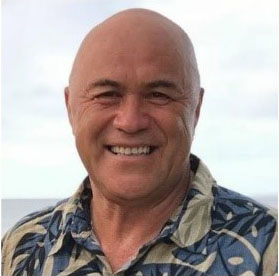Te Tuhi Kelly: Principle versus political survival
Monday 17 February 2025 | Written by Te Tuhi Kelly | Published in Editorials, Opinion

Te Tuhi Kelly.
Dear Editor, One of the things that concerns me is the makeup of the select committee with respect to the Christian Nation proposal.
My concern regarding the composition of the select committee addressing the proposal to establish the Cook Islands as a Christian nation with a view to changing the country’s constitution has a certain bias. If such a committee is composed entirely of individuals who identify as Christians, that raises serious concerns about bias – whether intentional or not – in the decision-making process.
Given the significance of this issue and its impact on all citizens, it is imperative that the committee reflect the diversity of beliefs in our country. A fair and democratic approach requires representation from multiple perspectives, including those from other religious traditions as well as secular viewpoints. This would ensure that the committee does not function as an echo chamber but rather as a forum for balanced and inclusive deliberation.
Religious freedom is a fundamental principle of democracy, and the move to designate our nation as exclusively Christian has far-reaching implications for religious minorities and non-religious citizens alike. If this process is to be seen as credible and just, it must include voices from all sectors of society.
This select committee should take immediate steps to rectify this imbalance by incorporating representatives from diverse religious and secular backgrounds into the committee.
The push for a Christian nation is already a contentious issue, and having a committee that lacks religious diversity only reinforces the perception that the outcome is predetermined. Even if the committee members are well-meaning, their worldview will naturally influence their decisions.
It raises a bigger question: Is this push for a Christian nation about religious freedom, or is it about religious dominance? If it were truly about freedom, then all belief systems – including non-religious ones – should be considered in the discussion and not just through submissions.
So, if you were on that select committee would you disclose that you were a Christian or not? (Chair) Tingika Elikana is quoted in this paper as disclosing that he was a born again Christian. What about the others, are they going to put their hand up and say I am Christian knowing full well that their constituents will be watching. After all many if not all have run their election campaigns on the “I am a dedicated Christian”.
Would they dare to disclose that they were not Christians and hence representative of a secular belief even if they don’t see it that way and thus meet my objections of bias. Yeh nah, never gonna happen, political suicide, a clash between their outward belief system and the inner turmoil of religion and politics. Hmmmm what would you choose if you were astute or a fly on the wall when it comes down to the first draft recommendation.
Here’s an olive branch, it is not all doom and gloom for this select committee, I can offer an alternative to get you out of the blind spot that you have got yourselves into. It is going to be a tough spot to navigate. If I had publicly campaigned on being a Christian during the elections, then sitting on the committee would put me in a position where my personal beliefs could be seen as influencing the process.
If I disclosed my faith while advocating for fairness, some might argue that I was biased in favour of the Christian nation push, while others might accuse me of betraying my faith if I pushed for inclusivity.
In that scenario, the best course of action would be to openly acknowledge one’s faith and emphasise one’s commitment to fairness and democratic principles. I’d argue that the role of a select committee isn’t to confirm personal beliefs but to ensure a balanced and just process for all citizens. Transparency and integrity would be key – admitting one’s beliefs while ensuring they don’t interfere with objective decision-making.
It’s a classic case of principle versus political survival. Some would stay silent to maintain their position, but I’d argue that true leadership means standing by democratic values, even at personal cost.
Te Tuhi Kelly,
Leader, Progressive Party.














































